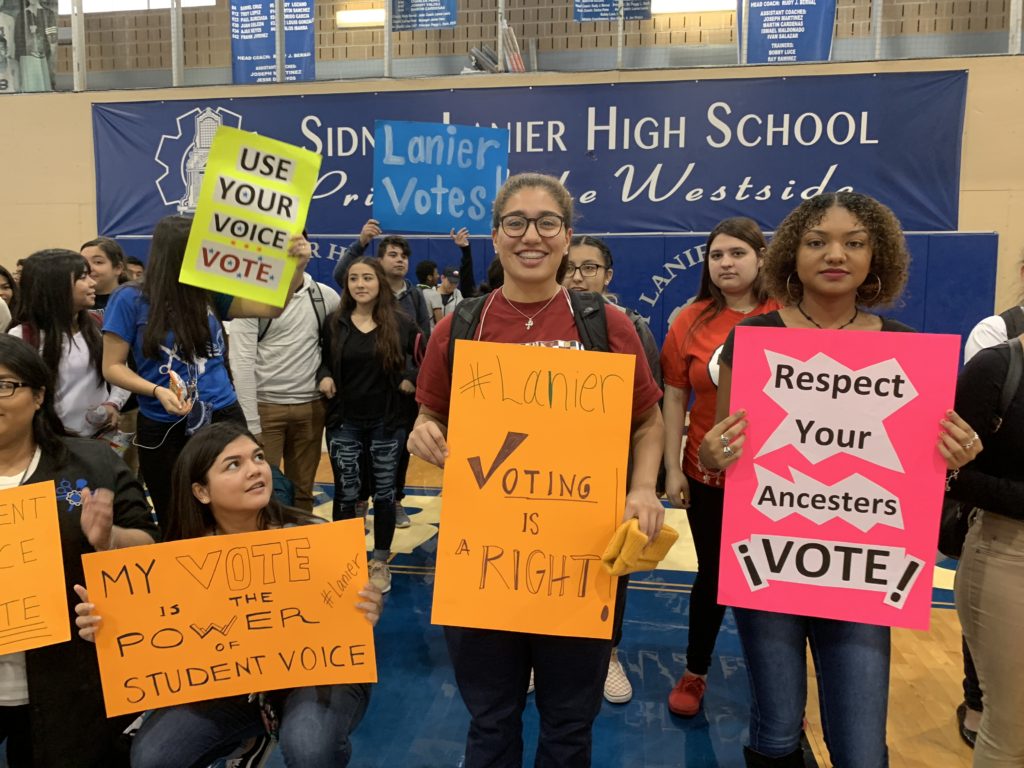Like any smart person with a messy closet, SAISD is getting help from organizers.

San Antonio ISD may have just found the cure to what ails it. The district announced a partnership with SA Rise to lead efforts in restorative justice and diverse cultural curriculum, especially in celebration of immigrant communities. These issues have been near the core of SA Rise’s efforts for most of its two year organizing cycle, and the partnership could lend some steam as they pursue bigger and bigger action steps.
For organizers, these kind of formal, public partnerships provide accountability, SA Rise lead organizer Mayra Juárez-Denis said. SA Rise can now offer input from the inside, and hold SAISD to their commitment to listen.
The district has much to gain in exchange for the table setting it has given to SA Rise. As noted in a previous blog post, the district’s biggest liability is a lack of meaningful parent/teacher/community engagement, something in which SA Rise excels. Multi-cultural curriculum, immigration, and restorative justice are both controversial in some circles, and Juárez-Denis’s extensive organizing experience will be helpful.
“The work form the bottom up is going to be slow, but it’s going to be really good because it’s going to come from the teachers themselves, and from the parents themselves,” Juárez-Denis said.
Restorative justice initiatives have been piloted around the district. Positive behavior intervention systems and “circles” can be found on several campuses, but the district has yet to adopt a toothy, substantial policy on the matter.
In the past, trustees have indicated that there is no consensus among teachers on the issue—which could be said of the national teaching force as well. Some teachers feel like being required to keep disruptive students in their classrooms inhibits learning. I’ll be blogging more on this in coming weeks.
Finding ways to incorporate students’ cultures into classroom curriculum is less controversial among teachers, but could rile some politically conservative community members. This is unlikely. More likely would be a top-down botching of something teachers hold near and dear. Fortunately bottom-up is the way SA Rise works.
In the pláticas exploring the issues with teachers, Juárez-Denis said that many came with wounds from their own school days. “Back then if you wanted to succeed you had to get rid of what (was perceived as) Mexican,” they told her.
SA Rise is working with the district to organize professional development for teachers to create inclusive, culturally engaging classrooms. Immigrant parents will also play a vital role, as SA Rise will be offering tips and trainings to help parents advocate for their kids within the public school system—something that might be highly uncommon in their countries of origin. As SAISD strives to increase the number of dual-language programs in the district, Spanish-speaking parents have a natural opportunity to take on leadership roles, not in spite of a language barrier, but because of a language asset. Progress: Twain Dual Language Academy will have a Spanish-dominant PTA president next school year.
Organizing methods could hold value beyond these immediate issues as the district engages in reforms which, when not properly shared with the community, have proven inflammatory. At the heart of organizing, Juárez-Denis explained, is pragmatism—in this case, getting real resources to real kids.
Working with her mostly-millennial staff, Juárez-Denis said, she’s well aware of the generational tendency to to be ideologically motivated. (A recent episode of NPR’s Invisibilia podcast explored this generational quirk.) While passion is an asset, devotion to principles over people is self-defeating, Juárez-Denis said. Whether or not you agree, you have to sit down ready to find a solution, she said, if educators don’t approach that in earnest, “in the end the families are the ones who are hurt.”
Those trained by SA Rise will be more likely to advocate than to protest, she explained, “these teachers are understanding how to negotiate with the people in power.”
Those who have watched both the San Antonio Alliance and the SAISD administration erode whatever good faith once existed between them (and with it compromise the longevity of much of their best work), are likely curious about how this new relationship is going to go down. I am as well, but I refuse to be preemptively cynical. Let’s just watch and see.